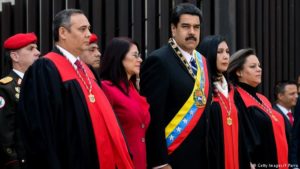by WorldTribune Staff, March 31, 2017
Venezuela’s Supreme Court on March 29 declared the opposition-run National Assembly to be invalid, seizing its powers and driving a country engulfed in chaos closer toward dictatorship.
The ruling also gave socialist President Nicolas Maduro widespread powers, including the ability to authorize joint oil ventures without congressional approval.

The once-wealthy nation is now destitute and has been racked by widespread food shortages and a crime epidemic.
Maduro is the ideological successor of the late Hugo Chavez, a key ally of Cuba’s Castro brothers and Iran as well as a virulent enemy of U.S. influence in the hemisphere.
“This is a dictatorship, and this was a coup,” Julio Borges, president of the National Assembly, said at press conference in Caracas.
“The world has to help us and set off alarms.”
“The National Assembly will not recognize the Supreme Court, because we were elected by 14 million Venezuelans,” Borges said. “The Supreme Court elected themselves. The court is acting outside of the constitution.”
In the March 29 ruling, the Supreme Court’s Constitutional Chamber declared the National Assembly was operating “outside the rule of law” after claims that the legislature was in contempt of previous legal statements.
“The Constitutional Chamber shall ensure that the parliamentary powers are exercised directly by this Chamber or by the body it appoints to ensure the rule of law,” the court’s decision said.
The U.S. State Department condemned the court’s decision, saying in a statement that the move “greatly damages Venezuela’s democratic institutions.”
Opponents of Maduro took control of the legislature after elections last year. Since then, the Supreme Court, largely loyal to Maduro, has curbed congress’s powers and overturned almost every piece of legislation passed before directly assuming congress’s functions on March 29.
The March 29 decision “is not only going to cause alarm for concern within the region, but also actions, and at this point, it will be very difficult for countries to remain neutral,” said Carlos Romero, a political scientist at the Central University of Venezuela in Caracas. “The government is provoking; not only has it not made a single gesture toward dialog, it has become completely entrenched.”
